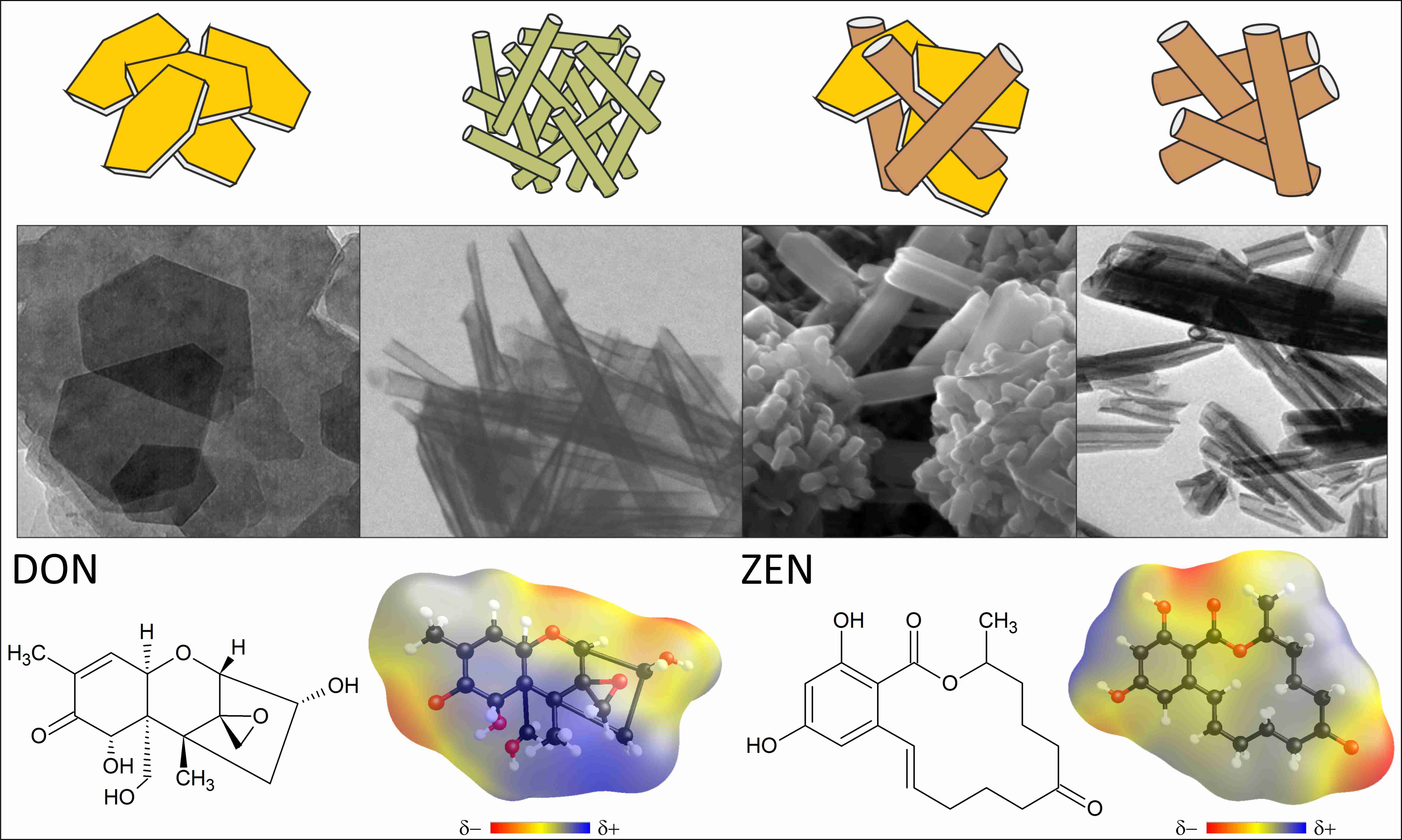Title: Nanotubular materials based on kaolin group minerals for the photodegradation of selected mycotoxins in aqueous environment
Duration: 2022-2025
Principal Investigator: Jakub Matusik
Key Investigator: Klaudia Dziewiątka
Funding agency: National Science Centre (Poland)
Project ID: Opus 22

Mycotoxins are complex organic compounds produced by filamentous fungi of different genera. They pose serious danger at very low concentration and most of them are highly toxic and carcinogenic. It is estimated that ~25% of all crops worldwide contain mycotoxins which are further transferred to aquatic environments. Solid state mineral adsorbents are easy to use and cost-effective for removal of pollutants from aqueous media. Especially clay minerals are capable of reducing toxins bioavailability, however their complete destruction is not possible by adsorption. This causes secondary pollution as regeneration and reuse of adsorbents is not always possible. On the other hand photodegradation of targeted hazardous compounds leads to their complete destruction via redox reactions.
In our earlier studies we have shown that kaolinite can be transformed into mesoporous nanotubes. Their formation mechanism and features were reported by our group. In the project we propose a methodology where kaolinite nanotubes will be impregnated by semiconductors to achieve high dispersion and thus high activity in photodegradation of mycotoxins. Up to date reports indicated the possibility of mycotoxins photodegradation. However, to our best knowledge, the research on photodegradation of mycotoxins by kaolinite-based materials is not available, especially in the form of nanotubular material. So far the materials based on kaolinite were used for photodegradation of volatile organic compounds, dyes, phenolic compounds and selected persistent organic pollutants. The subject combines knowledge of experimental mineralogy and materials science with environmental protection.
Reviewed articles
Dziewiątka, K., Matusik, J., Herber, M., Hill, E.H., Kuc, J., Cempura, G., Jędras, A. (2025) Enhanced photodegradation of zearalenone with kaolin group-based nanotubular materials: Unveiling reaction mechanisms and pathways. Chemical Engineering Journal, Volume 506, 2025, 160198. https://doi.org/10.1016/j.cej.2025.160198.
Dziewiątka, K., Matusik, J., Trenczek-Zając, A., Cempura, G. (2023) TiO2-loaded nanotubular kaolin group minerals: the effect of mineral support on photodegradation of dyes as model pollutants. Applied Clay Science, 245, 107123. https://doi.org/10.1016/j.clay.2023.107123.
Conference materials
Dziewiątka, K., Matusik, J., Herber, M., Hill, E.H., Cempura, G. (2024) Sustainable kaolinite-supported photoactive materials for enhanced photodegradation of zearalenone: in-depth assessment of physical and electrochemical properties, in: ACS Fall 2024: Elevating Chemistry, Denver, August 18-22, CO, USA. https://scimeetings.acs.org/exhibit/Sustainable-kaolinite-supported-photoactive-materials/4091614
Dziewiątka, K., Matusik, J., Kuc, J., Jędras, A., Bartusiak, A. (2024) Exploring the mechanisms and pathways of zearalenone mycotoxin photodegradation by kaolinite nanotubes-based composites, in: ACS Fall 2024: Elevating Chemistry, Denver, August 18-22, CO, USA. https://scimeetings.acs.org/exhibit/Exploring-mechanisms-pathways-zearalenone-mycotoxin/4100117
Dziewiątka, K., Matusik, J., Kuc, J. (2024) Photodegradation of zearalenone with kaolinite nanotubes-based photocatalysts: mechanisms and pathways, in: 11th MECC 2024, Pilsen, Czech Republic, September 15–20, 2024.
Dziewiątka, K., Matusik, J., Herber, M., Hill, E.H., Cempura, G. (2024) Nanotubular photocatalysts based on kaolin group minerals for zearalenone degradation, in: 11th MECC 2024, Pilsen, Czech Republic, September 15–20, 2024.
Dziewiątka, K., Matusik, J., Cempura, G. (2024) Efficient photodegradation of zearalenone: Unraveling the potential of photocatalysts based on kaolin group minerals: in: EGU General Assembly 2024, Vienna, Austria, 14-19 April 2024, pp. 1–2. https://doi.org/10.5194/egusphere-egu24-9623.
Dziewiątka, K., Matusik, J. (2023) TiO2-loaded nanotubular materials based on kaolin group minerals as spatially confined nanoreactors for photodegradation of deoxynivalenol, in: EUROCLAY 2023 International Conference of European Clay Groups Association, Bari, Italy, 24-27 July 2023, pp. 71.
Matusik, J., Dziewiątka, K. (2023) Kaolinite-based nanotubes – current state of knowledge on synthesis, properties and applications, in: EUROCLAY 2023 International Conference of European Clay Groups Association, Bari, Italy, 24-27 July 2023, pp. 174.
Matusik, J., Dziewiątka, K., Cempura, G. (2023) Unraveling the structure-property relationship of adsorbents and photocatalysts derived from 2D layered materials of natural and synthetic origin, in: SCANDEM 2023, 73rd Annual Meeting, June 12-15, Uppsala, Sweden : Book of Abstracts. pp. 64–65.
Matusik, J., Dziewiątka, K. (2023) The effect of synthesis conditions on formation and properties of kaolinite-based nanotubes, in: 60th Annual Meeting the Clay Minerals Society, Austin, May 20-25, 2023: Program and Abstracts. pp. 138.
Dziewiątka, K., Matusik, J. (2023) A comparative photocatalytic study of TiO2-loaded nanotubes derived from kaolin group minerals: evaluation of degradation efficiency using dyes as model pollutants, in: 60th Annual Meeting the Clay Minerals Society, Austin, May 20-25, 2023: Program and Abstracts. pp. 47.
